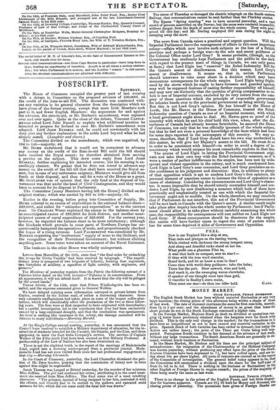The news from Canada, raises a practical and urgent question.
Will the Imperial Parliament leave the management of affairs in this most important colony—affitirs which now involve such subjects as the loss of a British province and perhaps a foreign war—to the sole and secret guidance of the Colonial Office under Lord Grey? It seems probable, (though, as the Government has studiously kept Parliament and the public in the dark with regard to the present state of things in Canada, we can only guess at facts,) that Lord Elgin has " reserved " the Rebel-Indemnity Bill for the Queen's assent or disallowance. But this means, Lord Grey's assent or disallowance. It means so, that is, unless Parliament should intervene to take some share in a decision which may have momentous consequences for the whole empire. Lord Elgin being fright- ened by the storm which he ought to have foreseen and guarded against, may well be supposed desirous of casting further responsibility off himself, and may now see distinctly that the question of giving compensation to re- bels is one of Imperial concern, excluded by its very nature from the cate- gory of those questions which the principle of responsible government for colonies bands over to the provincial government as being strictly locaL But this is not Lord Grey's opinion. He has himself in the House of Lords, like Mr. Hawes in the House of Commons, treated the Rebel.. Indemnity question of Canada as one of no Imperial moment, with which a local government ought alone to deal. Mr. Hawes gave us proof of the sincerity with which he and his chief hold this view, when, after the dis- turbance of Canada had already become formidable, he assured the House of Commons, not only that he was officially ignorant of the whole subject, but that he had not even a personal knowledge of the facts which had been for some days reported in the newspapers of this country. We may as- sume, therefore, that if Lord Grey should have his own way unchecked in this matter, he will give her Majesty's assent to the bill. He must do so in order to be consistent with himself—in order to avoid a degree of in- consistency which would surpass his most remarkable exploits in that line.
The course of Lord Elgin in letting the Provincial Government origi- nate and take their own way with the Rebel-Indemnity measure, as if it were a matter of perfect indifference to the empire, has been met by wide- spread and violent opposition in the colony, and is much condemned here. LordElgin is Lord Grey's near connexion, and Lord Grey proclaims an en- tire confidence in his judgment and discretion: thus, in addition to plenty of that opposition which is apt to confirm Lord Grey's first opinions, the personal element of nepotism comes to increase the force of opposition as a cause of obstinacy. Considering the circumstances and Lord Grey's charac- ter, it seems impossible that he should utterly contradict himself, and con- demn Lord Elgin, by now disallowing a measure which both of them have practically and emphatically treated as one with which the Imperial Go- vernment ought not to meddle. On the whole, therefore, we may conclude that if Parliament do not interfere, this act of the Provincial Government will be sent back to Canada with the Queen's assent. A similar result might take place after inquiry into the whole matter by Parliament: but if Parlia- ment should allow it to take place without carefully examining.the whole case, the responsibility for consequences will rest neither on Lord Elgin nor Lord Grey. If those consequences should be disastrous for the empire, this nation will have further cause to regret the state of parties which has for some time deprived it alike of Government and Opposition.


























 Previous page
Previous page